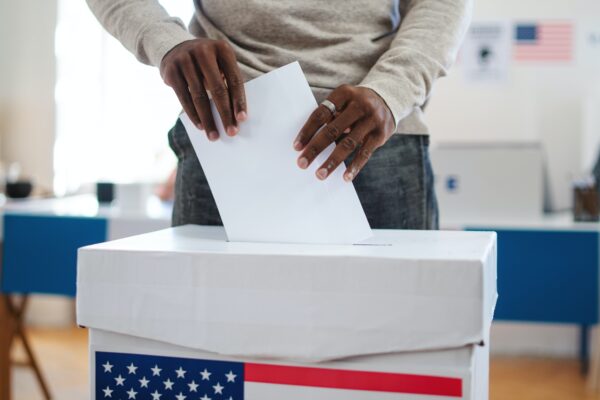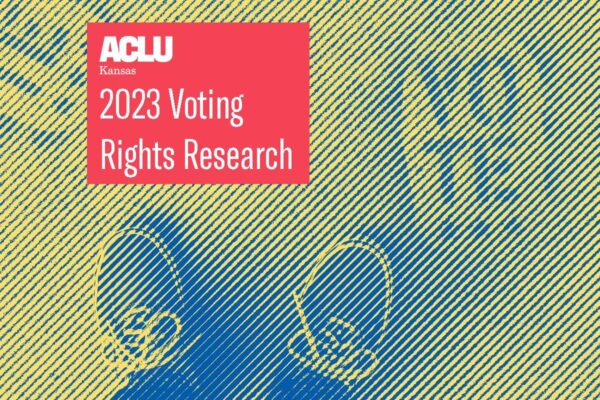

REPRESENT! RECLAIMING OUR VOTE AND RESTORING OUR DEMOCRACY
By completing this form, I agree to receive occasional emails per the terms of the ACLU’s privacy statement.
Last updated on September 15, 2025
REPRESENT! RECLAIMING OUR VOTE AND RESTORING OUR DEMOCRACY
REPRESENT! RECLAIMING OUR VOTE AND RESTORING OUR DEMOCRACY
The constitutional right to vote is the heart of our democracy and system of governance. The right to vote is the vehicle through which a citizen has a voice in selecting and holding accountable those in power. We should make it easier, not harder, for all eligible Kansans to vote.
However, Kansas has been the epicenter of efforts to undermine the right to vote for years. More recently, elections officials and state lawmakers have created new voting restrictions or neglected to eliminated existing barriers, and it is difficult for eligible citizens to have their voice heard throughout the process, from registering to vote, to casting a ballot. Many rules preventing access for some voters are not only unnecessary for the electoral process, but are grounded in a history of racist and classist disenfranchisement. This undermines the fundamental right to vote rather than honoring and supporting it for all voters, regardless of political leaning.
There are a number of ways to remove barriers and improve access for all eligible voters throughout the voting process, from registering, to casting a ballot, to ensuring that every ballot counts. Between working, caring for families, and other responsibilities, local election officials in Kansas have the authority under state election law to maximize opportunities to protect the right to vote and maximize turnout -- yet many don't. You can sign up to join us and increase access to democracy in your local community here.
PRIORITY 1: Expand early voting
Kansas counties with the longest early voting periods tend to have the highest turnout – there is a clear connection between early voting and voter participation. Kansas law allows early in-person voting to begin 20 days before Election Day, but local elections officials decide to varying degree how much to take advantage of that. Communities with only one voting location require some voters to travel considerable distance to vote early, undermining the convenience of voting early in the first place. This means that an individual’s access to vote depends on their zip code and county. By expanding the number of early voting locations and the number of early voting hours to include the full 20 day period before Election Day, weekends, and hours outside of 8 am to 5 pm, election officials can ensure that busy Kansans can have increased access to take advantage of early voting.
PRIORITY 2: Increase accessibility
For many eligible Kansas voters, there are signifcant physical barriers for them get to a poll or cast a ballot. County election officials can ensure accessibility and equity by:
- Implementing Curbside Voting: Kansas law allows for people with disabilities to vote curbside–a vital service for people with mobility issues and health concerns. Unfortunately, a 2018 report by the ACLU of Kansas found that only one county discussed curbside voting in their training materials for poll workers. While more polling locations may have increased access to this service during the COVID-19 pandemic, there is significant room for improvement. Election officials should implement specific training for poll workers on how curbside voting can be implemented and make efforts to publicize the availability of curbside voting for people with disabilities, including with signage and call button systems.
- Increasing the number of Election Day polling locations in geographically diverse jurisdictions: Increasing the number of available polling locations will cut down on travel and wait time for voters. Making sure those locations are in diverse neighborhoods will also create a more welcoming environment by ensuring all voters can vote close to where they live.
- Improving language access: Federal law requires counties to provide translated election materials if 5% of citizens of the voting age population have limited English proficiency. In Kansas, that means only Finney, Ford, Grant, Seward, and Haskell counties have materials in Spanish. But just because a group of people doesn’t meet the federal population threshold doesn’t mean they shouldn't have access to election materials in their primary language. Providing translated election materials is a simple way to expand access to the vote, and local election offices have the authority to make it happen.
- Implementing "Vote from Jail" Programs: When someone is in jail, they are typically being held pre-trial, and therefore they have been charged but not convicted of any crime—meaning they are still eligible to vote. If someone is a citizen, a resident of Kansas, at least 18 years of age, and not serving a sentence for a felony conviction, they are eligible to vote–even in jail! Making sure people are aware of this right by offering education, registration, and voting programs at local detention facilities is a critical step to ensuring people can continue to exercise their right to vote.
- Offering prepaid postage for mail-in ballots: In the modern age, fewer and fewer people make a practice of keeping stamps on hand. No one’s ballot should be delayed or even overlooked simply because of a stamp. Implementing prepaid postage for all mail-in ballots is a simple way to ensure that eligible votes are counted.
- Ensuring people with felony records know their rights. In Kansas, when people are convicted of a felony, they lose the ability to vote—this is called "felony disenfranchisement." What many people don't know is that once you've completed your sentence (including any term of supervised release), you can vote. Learn more about our Voter Restoration Project here.
Documents
Featured Cases

- Voting Rights
Coca and Rangel-Lopez v. City of Dodge City
Related Issues
Related Content

- Voting Rights


